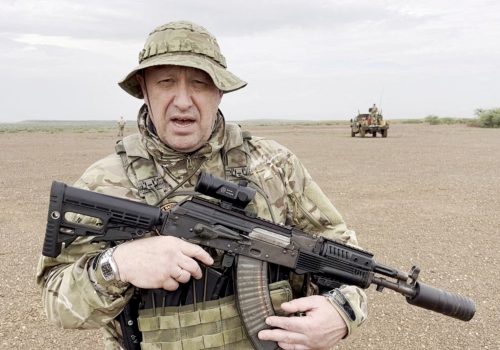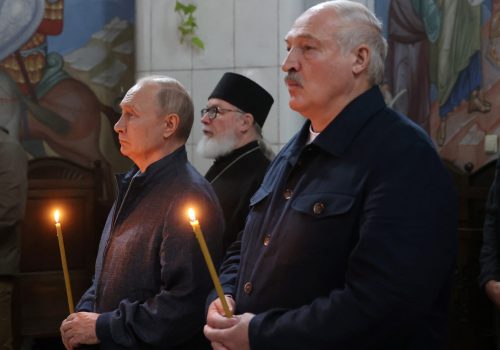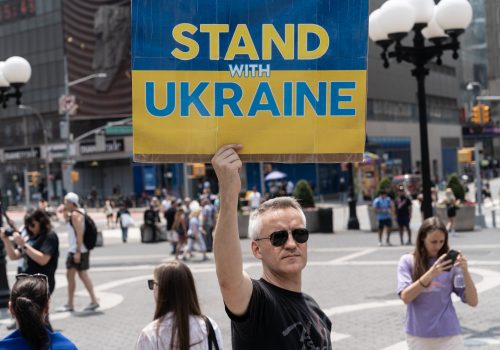What Prigozhin’s plane crash tells us about Putin’s Russia
JUST IN
The plane was flying northwest, then events went south quickly. On Wednesday, Wagner Group founder Yevgeniy Prigozhin and nine other people were reportedly killed when their aircraft, en route from Moscow to Saint Petersburg, crashed under mysterious circumstances. In late June, Prigozhin led a short-lived mutiny in Russia that involved a convoy of armed forces coming within 125 miles of Moscow, in what was widely interpreted as a humiliation for Russian President Vladimir Putin. Our experts weighed in on what to make of the mercenary’s apparent death and what to expect next.
TODAY’S EXPERT REACTION COURTESY OF
- Dan Fried (@AmbDanFried): Weiser family distinguished fellow and former US ambassador to Poland
- Brian Whitmore (@PowerVertical): Nonresident senior fellow at the Atlantic Council’s Eurasia Center and former foreign correspondent in Moscow
- Ariel Cohen (@Dr_Ariel_Cohen): Nonresident senior fellow at the Atlantic Council’s Eurasia Center
- Rama Yade (@ramayade): Senior director of the Africa Center
Mafia movie
- Dan says the plane crash “seems like an act of slightly delayed revenge, something out of the Godfather series.” If it is murder, it fits Putin’s style, he adds. “The only unusual feature is that Prigozhin was not pushed out of a window or shot on the street or in an apartment stairwell, like other Kremlin opponents, but shot down from a plane in lurid fashion.”
- Brian picks up on this vendetta theme, adding that “the Putin regime essentially operates according to the logic of a crime syndicate. Putin is the godfather. Prigozhin was a capo who apparently didn’t know his place.”
- Dan adds that “murder and fear can work in the short run,” but Putin could become vulnerable if too many of his decisions fail for too long—including Russia’s war in Ukraine. “A tyrant such as Putin, history shows, has agents and servants but no real allies or friends,” Dan says.
- In the past, political change has come to Russia when three factors are present, explains Brian: “a divided elite (check), a dissatisfied public (check), and an absence of fear.” If Prigozhin had been left unpunished for his mutiny, he adds, the third condition would have been met and “the regime would have been in peril.”
Kremlin choreography
- Brian notes that as news of the plane crash spread, Putin was presenting the Hero of Russia award to soldiers live on television, the same award he gave to Prigozhin in June 2022. “So the optics of Prigozhin’s elimination appear to have also been carefully choreographed.”
- But the choreography only gets more difficult from here. It will be hard to integrate Wagner forces into the Russian military, Ariel explains, “as many fighters are personally loyal to Prigozhin.” Moreover, “the state armed forces’ affiliation would even further dilute the already-tenuous plausible deniability the Russian state-supported mercenaries have enjoyed.”
- Expect further infighting in Russia among the Federal Security Service, Duma, presidential administration, security services, Kremlin-connected oligarchs, and other factions, explains Ariel. “This struggle will escalate as the jockeying for Putin’s legacy proceeds to its inevitable end.”
The Africa angle
- Under Prigozhin’s leadership, Wagner Group’s activities in Africa reaped major benefits for the Russian state, “including mining concessions and efficient anti-Western propaganda,” Rama points out. But the Wagner mutiny complicated the relationship between the mercenaries and the government.
- “Even after his exile, Prigozhin was a threat to Russian interests in Africa, maybe a competitor with rival interests,” says Rama. Now, with his apparent death, there are three possible futures for the Wagner Group on the continent, she adds: “its dissolution, its nationalization by the Russian state, or the appointment of a new leader.”
- Dissolution seems the most unlikely since Russia wants to keep its business and security interests in Africa. “It is a primary goal,” Rama explains.
- Africa, adds Rama, is also key to Putin’s strategy in Ukraine as a way “to prove he is not isolated, to circumvent Western economic sanctions, and rebuild his forces via Wagner.”
Further reading
Wed, Aug 23, 2023
Experts react: What the Prigozhin plane crash reveals about Putin, the Wagner Group’s future, and the war in Ukraine
New Atlanticist By
Experts weigh in on what the mercenary leader's apparent death will mean for the Russian state and Wagner's operations abroad.
Tue, Aug 22, 2023
Belarus dictator Lukashenka must face justice for role in Russia’s Ukraine war
UkraineAlert By
It is time for a serious conversation on how to hold Belarusian dictator Alyaksandr Lukashenka accountable for his participation in Russia’s brutal full-scale invasion of Ukraine, writes Katie LaRoque.
Tue, Aug 22, 2023
Americans’ support for helping Ukraine remains strong. Just look at the polls.
New Atlanticist By Andrew D’Anieri
Polling uncovering Americans' views of US aid to Ukraine should embolden US politicians to continue to advocate for Kyiv’s victory over the Russian invaders.
Image: Wreckage of an aircraft fuselage on the ground in flames following an alleged air crash at a location given as the Bologovsky district in the Tver region, north of Moscow, on August 23, 2023.


